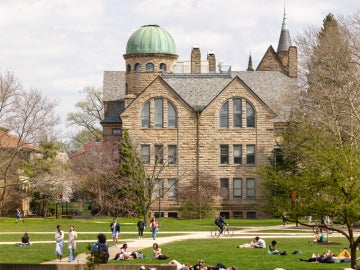Summer of Justice
Darius Butler explores human rights across three continents through a Frederick Douglass Global Fellowship.
May 26, 2023
Henry Hicks IV

Rising senior Darius Butler is one of 12 students in the United States selected to participate the in Frederick Douglass Global Fellowship.
Photo credit: Jacob Strauss
Darius Butler will devote four weeks this summer traveling between Washington, D.C.; Cape Town, South Africa; and Dublin, Ireland, to learn from the legacies of social justice giants who made global footprints. Now completing his third year at Oberlin, Butler is one of 12 U.S. college students selected to take part in the Frederick Douglass Global Fellowship.
“To be selected as a Frederick Douglass Global Fellow is an incredible honor and something I am blessed to be a part of,” says Butler, originally from Lewis Center, Ohio, near Columbus. “Ultimately, this fellowship will help me heighten my sense of how to advance effective and tangible social change within my community.”
The fellowship, co-sponsored by the government of Ireland, recognizes the historic convening of abolitionists Frederick Douglass of the U.S. and Daniel O’Connell of Ireland in 1845. Their meeting was a notable marker for international solidarity between movements and fueled a practice of education and exchange between movement leaders that continues today. Douglass Fellows will examine the impact of the Emancipation Proclamation in the U.S. and the anti-apartheid movement in South Africa.
Butler, an Africana studies and law and society double major, is driven by his desire to make an impact in the lives of others. In his first three years on campus, he has assumed leadership roles in the Lord-Saunders Afrikan Heritage House, Voices for Christ, and the Writing Center. Away from campus, he led an annual toy drive for local children in collaboration with Mt. Zion Baptist Church. He has supported advocacy efforts as a legal intern for Columbus judge Stephanie Mingo and as a racial justice research fellow with the advocacy nonprofit As You Sow. He plans to attend law school, continuing his passion for advancing racial equity through legal advocacy in the nonprofit sector.
“The need for Black representation in the legal profession in the U.S. is imperative, because Black people have a lifetime of experience and perspective on what it’s like to be systematically excluded and discriminated against by institutional systems and structures,” says Butler.
He credits Oberlin’s Africana Studies Department for supporting his growth as a scholar and advocate, and he is particularly grateful for the mentorship of professors Candice Raynor, Charles Peterson, and Yveline Alexis—just a few of the many faculty and staff advocates he has leaned on during his time on campus. Their support, he says, is critical to his success thus far and in shaping his perspectives and ambitions moving forward. His appreciation for their leadership reflects his admiration of historical organizers, journalists, and movement leaders—figures such as James Baldwin, Ida B. Wells, Angela Davis, and Fred Hampton—whom he has long viewed as titans in the quest for racial justice.
Butler is especially moved by the life and legacy of Hampton, the late civil rights activist who was a leader of the Black Panther Party and founder of the Rainbow Coalition before being killed in 1969. “I’m in awe when I listen to his speeches or interviews because of the power of his words,” he says. “The fact that he was the same age as me, yet could do such remarkable and impactful work, is incredible.”
Butler’s fellowship will include opportunities to learn from human rights leaders of today. One of them is Mpho Tutu van Furth, an Anglican priest and activist who is the daughter of the late Bishop Desmond Tutu.
“This will be my first time traveling outside the U.S.,” he says, “and I know the knowledge and relationships I will build during my time in Ireland and South Africa will last for a lifetime.”
You may also like…
Oberlin Launches Critical AI Studies Minor in Fall 2026
With a solid foundation in both science and the humanities, this minor ensures students to understand and be able to analyze the ethical, cultural, environmental, political, economic, technological, and labor effects of AI.
Chudi Martin Jr. ’24 Earns Prestigious Gates Cambridge Scholarship
Chudi Martin Jr. ’24 earns prestigious Gates Cambridge Scholarship.
Oberlin Named a Top Producer of Fulbright Students for 2025-26
Oberlin College and Conservatory was named a Top Producer of Fulbright students for the 2025-2026 academic year.


